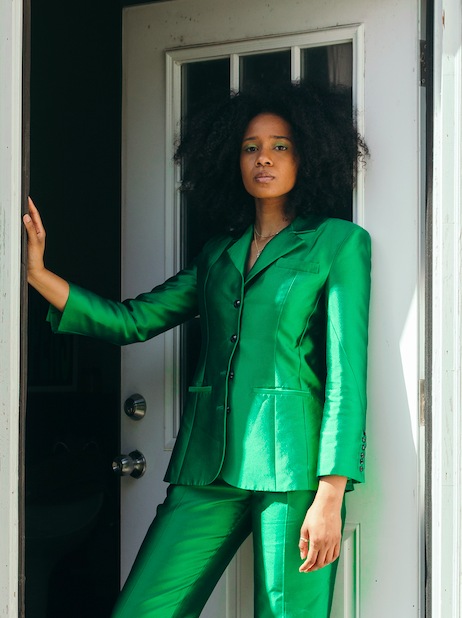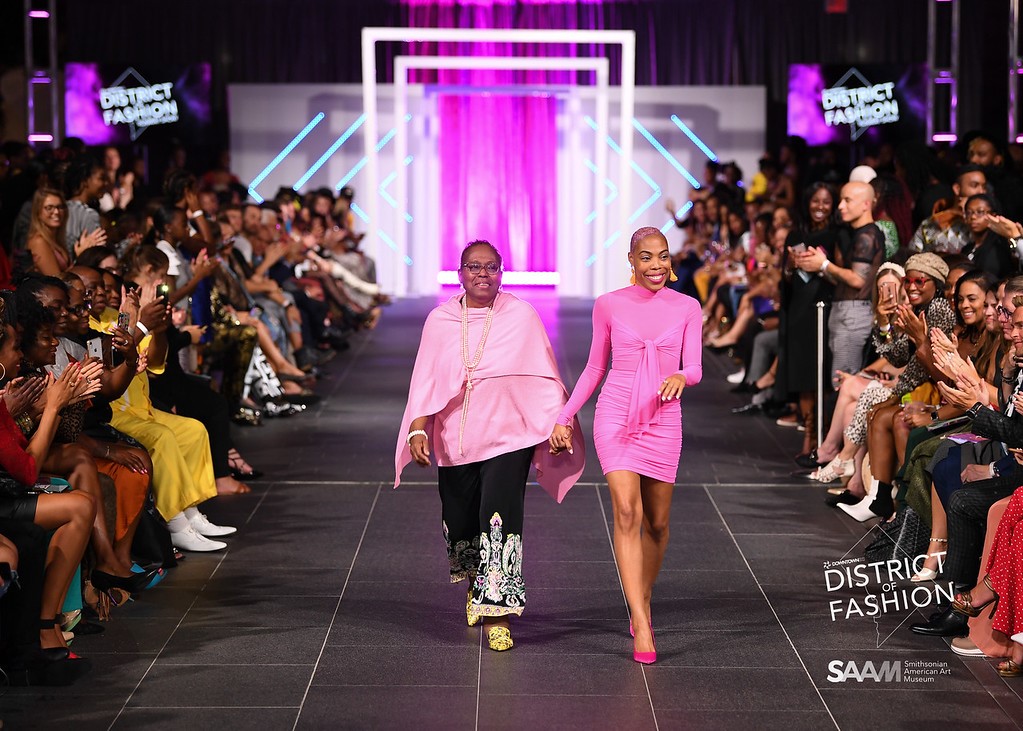How Naomi Elizee Fosters A Community for Young Women of Color
July 15, 2020
Nicky Campbell


Naomi Elizée grew up dreaming of working in fashion. Like many young women, reading through the pages of glamorous fashion magazines inspired her to strive for a career in the industry. However, unlike many of her counterparts, there was no one she could identify with as a woman of color. Armed with resilience and perseverance instilled within her by her Haitian heritage, Elizée earned her stripes after working her way up the ladder as a buying and planning intern at Saks Fifth Avenue and then a fashion assistant at Seventeen. Now, she serves as the Associate Market Editor at Vogue – which was on her vision board in high school.
To help inspire the next generation of Black executives in fashion, she launched her own podcast “So… What do You do Again?” to highlight trailblazing women of color and show there is a space for those who don’t always see themselves represented. Below, the fashion editor on her experience in the industry and advice for young women.
Tell us about your podcast, “So…What do you do again?” What inspired you to start this, and why are these stories important to tell?
My interest in working in the fashion industry grew while I was in Highschool, but the more I did my research, the more I doubted my ability to work in the industry because of the lack of representation of Black women in these spaces. When I discovered there were Black women who held coveted positions in fashion, I gained the confidence to position my goals as attainable and no longer as a pipe dream. I created “So…What Do You Do Again?” “for those aspiring young individuals out there who long for representation in the spaces they want to occupy, just like I once did. “So…What Do You Do Again?” is a podcast centered around celebrating and amplifying the voices of women of color who are transforming the fashion industry. With each episode, I strive to empower and inspire listeners through raw conversation, highlighting not just my guest’s journey in the fashion industry but how they have risen above the personal and industry imposed challenges of being a woman of color. It’s important to tell these stories because the fashion industry is notorious for being exclusive and it can be daunting to try and make your way through the door, let alone remain in the room. I created SWDYDA in an effort to bridge that gap. To give listeners direct access to the women who are currently in these coveted spaces and allow them to learn from them and use these interviews as a resource for their own personal and professional growth.
As the daughter of two Haitian immigrants, how does your heritage shape your experience and impact your work?
The history of Haiti is so rich in beauty, strength, perseverance as well as heartbreaking tragedy. The spirit of our people is unmatched and my parents have always made sure I knew of my Haitian Heritage and roots. Growing up, my parents instilled faith, resilience and courage as our core family values. Although my parents may not have understood my career aspirations they never discouraged me from seeking success in it. They have taught me to never back down on my ambitions and fight for what I believe in. These values that I’ve grown up on have shaped me into the person I am today as I refuse to allow myself to be silenced. I speak up for those who cannot speak for themselves, and continue to stay the course no matter how many obstacles I face.
https://www.instagram.com/p/B-U00gXgOpq/
In your position as Associate Market Editor at Vogue, what are some of the ways you advocate for diversity & inclusion?
As an editor at Vogue, I have always been hyper aware of my access to the industry and the opportunities I can form for others. In an effort to make my workplace more diverse, I always recommend a person of color whenever there is a new job opening. The first step to making real change is through the people you hire and although I do not have the power of recruiting talent, I make it an effort to try and shift the type of person we typically hire. Another way I try and enact change is through introducing young POC designers to my colleagues in order for them to form and build relationships. Over the years, young designers have expressed to me the struggles of securing meetings with editors across all publications. They do not have an already established relationship with them nor the PR representation who could introduce them to editors who can completely shift their business. It’s important to me to try and get as many young POC designers in the room as possible and to cultivate and nurture young talent. It’s time we support them as much as we support more established brands who already have the access and money to succeed.
Who are some of the women in your career that you look up to or have helped guide you through this industry?
Two women who have always been by my side and have championed my success are Chioma Nnadi and Rajni Jacques. I have so much gratitude for them and I am thankful to have them in my corner. Chioma and Rajni are both powerful voices at Conde Nast and have always advocated for the Black community. It’s inspiring for someone like me, who is still at the beginning of their career, to watch two Black women unapologetically take the industry by storm and make their voices heard. It allows me to recognize my power and potential to make change in the industry.
Do you have any advice for young WOC in the fashion industry trying to break into the industry?
Don’t let the insecurity of others impact your growth: There have been many times where I was discouraged from trying to make my dream of working in the fashion industry a reality. It came from friends, family and even my teachers. It’s important to not allow the negativity and the opinions of others to affect the way you think of your goals and aspirations. At the end of the day, the opinion that matters is your own. Believe in the art of manifestation and continue to work towards your goals while silencing the pessimistic mentality of others.
Network up, but also network across: Focus on building relationships with your peers at the same level as you and not just the people who hold the positions you aspire to be in. Your peers are more likely to make time for you and more willing to flesh out ideas and exchange knowledge. Who is interning with you? Who is assisting with you? Who is struggling just as much as you are? Those are the people you need to be connecting and forming bonds with.
Take initiative: There is so much value in taking control of your path. A lot of young people ask me how they can land an internship/ job in the industry with little to no experience and the answer is create your own experience. Want to write for a publication? Develop your own online blog where you can write about the things that interest you while also using these as writing examples for your next application. Want to be a stylist but don’t live in a fashion capital? Connect with creatives in your area and produce your own editorials for your website and for social media. You never know who is watching or who may happen across your work. These are easy ways to build your portfolio while also gaining experience.
https://www.instagram.com/p/B_ncjazAHvf/
What is keeping you inspired or hopeful these days?
Although it is an incredibly difficult time, watching the momentum of the global protests has been incredibly inspiring for myself. The strength of our community gives me hope. We won’t stop fighting till we make some real change and we will continue to make noise and be in the streets until that happens.
How can the fashion industry do better? Where do you want to see change?
Whew — what doesn’t the Fashion industry need to do better on? This industry was built on elitism and exclusivity. The fashion industry continues to lack representation for people of color and the LGBTQIA communities. We need to dismantle how we view and think about the industry completely. Given all that is going on as we continue the fight for racial equality, the industry seems to be shifting their awareness for change but I am weary of the actual *action* to get to said change. While most of this change is coming from the marginalized and underrepresented groups who are coming up with solutions while their white counterparts sit by. It can’t just be these marginalized groups doing the work, we need the allyship of white people who hold power to make actual change happen.
Honestly, I would like to see change within the entire structure of the Fashion Industry. More specifically, I would like more representation of POC and LGBTQIA designers published and recognized. Also, seeing more Black talent promoted to senior and C-Suite level roles.
Is there any advice you have for non-black co-workers on how to be an authentic and true ally?
Recognize your privilege: Understanding your privilege as a white person allows you to understand how racism and prejudice can affect the trajectory of one person’s life and career. It’s critical for white people to have these conversations about race so that they can recognize how they benefit from a society that suppresses the growth and voices of marginalized groups.
Educate yourself: Be cognizant of the fact that it is not the job of your Black coworkers to educate you on racism, systemic oppression and the effects of it in our community. It is not our job to help you unpack the injustices we face everyday. It is not the job of the oppressed to teach about oppression. It’s on you to do the work. It is your job to educate yourself and the people close to you who have been noticeably silent during this time.
Recruit, Hire and Promote Black People: I said this before, and I will say it again. We need to recruit, hire and promote more Black people. Not just at entry-level and mid-level but at the senior and c-suite level. We need to deconstruct the idea of Vanity hires, where a company hires a Black person at a certain role for a surface level representation while they stunt their growth and give them little to no power to make any change. Cultivate your talent and allow them to feel supported. It’s no longer about having a seat at the table, but about having the resources and the power to change who else is seated with you.
PHOTOS COURTESY OF NAOMI ELIZEE

